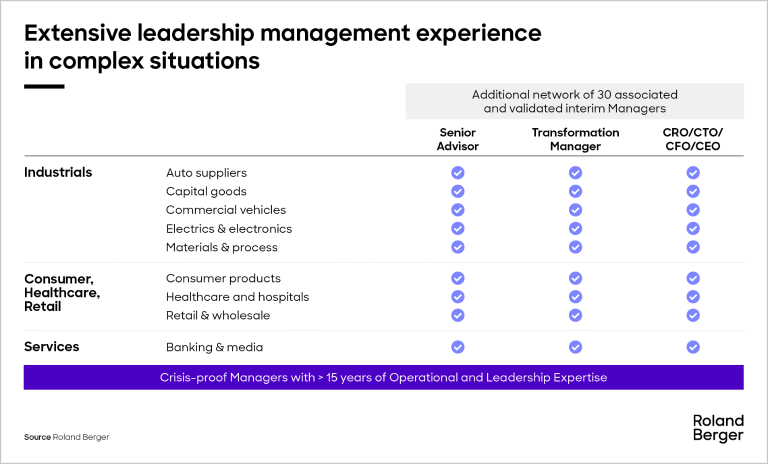The mood in the European bicycle industry is poor. After the boom years of 2021/2022 with exorbitant growth rates, manufacturers are now in crisis due to high inventory levels, increased costs, and discount wars. In 2023, the sales of non-motorized bicycles and e-bikes in Germany dropped by 13 percent compared to the previous year. Although the demand for e-bikes remains relatively stable, the market recovery is taking longer than expected.


Interim Management
Interim management for companies in special situations
Restructuring & Turnaround
Corporate Performance
People & Organization
Many companies do not have sufficient internal management capacity to handle special situations outside of their normal business operations – these may be challenging strategic realignments and transactions or even dangerous profit and liquidity crises. If you are in this position, the team from Roland Berger IMPEX (Interim Management Performance Executives) can assume full management responsibility for your business through a transitional phase, temporarily bringing in the missing skills and navigating your company safely through uncharted waters. In addition to traditional management consulting, our experienced interim managers assume business responsibility, supported by teams of crisis-proven experts.
Challenges and problems for companies undergoing transformation
Recently, more and more companies are finding they do not have the quantitative or qualitative capacity to manage a demanding corporate transformation or restructuring using their own resources and expertise. The challenges are many and varied, and they call for sound implementation. The crisis management agenda incorporates tasks such as securing liquidity, financing or refinancing, stakeholder management, specific sales and purchasing initiatives as well as offshoring and cost-cutting projects. It is not uncommon to find fundamental problems like overwhelmed management teams, fragile supply chains and tight profit margins added to the mix. Extensive, hands-on external support may also be necessary in other cases, too – perhaps for value creation programs during a portfolio company's holding period or for structural adjustments necessitated by carve-outs , acquisitions ( M&A ) or restructuring exercises .
"The Roland Berger IMPEX team doesn't just make recommendations – they deliver measurable results."
Interim management from Roland Berger
With the support of a Roland Berger team, our IMPEX interim managers can assume full business responsibility for a company in crisis throughout a temporary period. As a rule, they will be supported by additional experts and the necessary project management office (PMO). Our extensive operational expertise and practical approach lead to solutions that will support your company effectively from day one.
Within the scope of their agreed decision-making authority, our interim managers will be responsible for results on a daily basis and can act as a temporary managing director or board member with full business responsibility as necessary. Our interim management mandates are about management, not consulting.

Interim management in hospitals
Interim management can play a decisive role when organizations are facing staff shortages or tackling far-reaching transformation processes. Our interim management offers tailored solutions for hospitals in need of executives on short notice. We understand the unique challenges in the healthcare sector and have interim managers with extensive experience in hospital management. Our goal is to deliver measurable results for your hospital and create long-term value.
The collaboration between IMPEX and our Healthcare team offers you a unique combination of established consulting services and strong implementation capabilities.
Register now to receive regular insights into our Interim Management topics.

_person_144.png)


